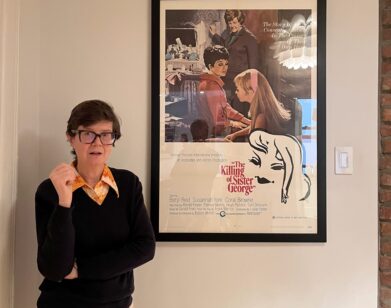A DVD That Scores

PHOTO COURTESY OF LYLE WORKMAN
With precious few rock-and-roll showmen left, Aldous Snow, played by Russell Brand in last summer’s Get Him To The Greek, was a fun if farcical throwback to the debauched stars of the last century. Grounding the crazy hijinks was his believable and infectious music—actually created by composer Lyle Workman. Creating an individual sound for the fictional rock star, Workman came up with a fully-formed album with radio-ready songs. A musician who has gone on tour with Todd Rundgren, Workman got his first cinematic job on the Vince Vaughn/Jon Favreau film Made. For Get Him to the Greek, Workman had the dream job of creating an album for a fictional rock star-no egos allowed. We chatted with Workman about writing offensive songs and what he wants in a sequel.
GILLIAN MOHNEY: Can you talk a little bit about writing for Get Him To The Greek? You had to write for fictional characters and it had to be funny, but they sound like real songs.
LYLE WORKMAN: You always want to make whatever project you’re working on, whatever you’re trying to do is make the music real. I don’t know if I’ve ever worked on a project where someone has wanted me to make it not-real. The only difference is that the songs that were recorded for the movie, Get Him To The Greek; we wanted really great material that stood on its own. I guess the only difference is that the subject matter is kind of skewed to a character that’s got addictions and vices, and the comedy had to be in the lyrics. But as far as the approach of the songs, the structure of the songs and how they were recorded was very much like doing a large-budget record of serious work, really. You take the lyrics away and they could really be taken as serious material. Again, we just wanted to make good music.
MOHNEY: The songs are really fun too. So you wrote for all of this, and did you also write for Jackie Q?
WORKMAN: I partnered with Jason Segel on a couple of songs. We did “Supertight” together. We did “Bangers, Beans & Mash,” we did “Going Up.” He started them and I kind of took them from there. We went back and forth a few times, then I had to turn what started as just a vocal and piano into full blown arrangements. And then we had many other writers too. We had Mike Viola, Dan Bern. Great team. These guys did some other work on Walk Hard. Great songwriters, Carl Barat of the Libertines, Jarvis Cocker. And a lot of credit goes to the music supervisor Jonathan Karp, for facilitating all of these different people to work on this project. Jonathan and Nick, the director of course, Judd.
MOHNEY: Did you ever reach a point where you said we need to push it further or you felt like you had pushed it too far with the lyrics?
WORKMAN: Well, yeah, I think we took it about as far as you can go. There’s one snippet of a song that I wrote in the movie called “Fuck Your Shit Up,” and that’s pretty offensive. It’s about as offensive as you can get. So it was kind of a no-holds-barred, but it was about the character. You know, how do we accurately portray this character as a real entity, as a real being. And so I don’t think there was ever any breaks or government on how offensive it could be as long as it fit the character.
MOHNEY: Writing for a faux rock star after working with real musicians—were you ever able to draw on your experiences?
WORKMAN: Well, a lot of this comes from: what does Aldous know? What were his influences? You know, what is he about? What did he listen to? What is his band like? So we would listen to songs just as touchstones to give us an idea of groups that he might have grown up on and might have influenced him. And you know, something like, we saw different parts of his career, there was a little mention, a little shot of him playing at the Greek Theatre in 1999, and so what was his band like then? So we were referencing. And then for the modern day, we thought maybe he’d be so global at this point maybe he’d be a big U2-style band or it’d be like this grandiose intro. That’s kind of how we started the song going up like a real, we decided to put some massive scale into where he’d be and where he eventually ended up as an artist.
MOHNEY: Did you have any favorite songs that you were working on?
WORKMAN: Well, there’s actually one that’s on the soundtrack that’s one of my favorite songs, and isn’t even in the movie. It’s called “Searching For a Father in America.” All the attention that was put on the music and the songs, I mean we really set out to make the best record we could make. It’s the same thing as if we were trying to make a U2 record. It’s still the same energy. We’re really happy with the end result and the CD soundtrack we’re really proud of. And we really hope that everyone who liked the movie, that they check out the soundtrack CD because it’s a straight up Infant Sorrow record… All of the songs you hear are fully fleshed out and recorded by a really fantastic band in major studios here in LA. Produced by good people. And so it’s really worth checking out… I mean this guy, if he’s supposed to be a rock star, well then we better back it up, otherwise it’s not going to ring true. If it’s not going to ring true, well, then you lose that dimension.
MOHNEY: Is it kind of a dream scenario that you have complete control over this album and are able to go as far as you want to musically?
WORKMAN: Yes. Yeah, it was dreamy. It’s fun for a person that makes music and likes that style of music. It was very rewarding and liberating to be like, “What do you want to do? Let’s do this,” we got to run these ideas back and forth. Jason and I did a song together that was kind of like a Stones-y kind of song and it just didn’t work in the film, and we actually didn’t finish that song. There was a lot of material that didn’t even make it.
MOHNEY: Wow, that’s a lot of work to not get put on the album.
WORKMAN: It really was. But when you’ve got that much extra material you get to really find the cream that really rises to the top.
MOHNEY: Were you able to go to any of the concert scenes to see them performing any of the songs?
WORKMAN: Yeah, I was at all of the scenes where Aldous and the band were performing—just support for Russell mostly. Since I worked with him on all of the songs, myself and Jonathan Karp, we needed to be there just to support. He certainly didn’t really need me, but it was great to watch him do his thing. He really brought it. We’re very happy with the way he put the muscles and flesh and skin on the skeleton of the character.
MOHNEY: If you were to do a sequel, magically, is there a kind of song that you’re dying to do that didn’t get on this album?
WORKMAN: I would like Aldous Snow to have some crazy relapse and, on a bad acid trip, decide he wants to do a progressive rock record. Like old Genesis or King Crimson. But that’s totally selfish. That’s completely selfish. I don’t think it would fly. That would have to be done tongue in cheek obviously. It would be really funny—sort of the jazz odyssey of Spinal Tap, “Baby Don’t Go.” Have them opening for puppet shows and things like that.
GET HIM TO THE GREEK IS NOW AVAILABLE TO OWN ON DVD AND BLU-RAY.






